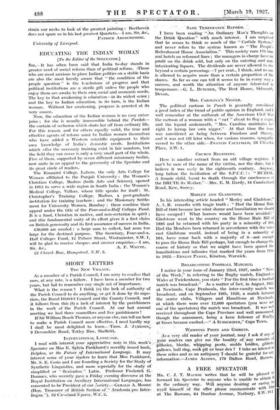SHORT LETTERS
THE NEW VILLAGE.
As a member of a Parish Council, I am sorry to confess that ours, at any rate, is a failure. I have been a member for two years, but fail to remember any single act of importance.
What is the reason ? I think (a) the lack of authority of
the Parish Council to anything, or get it done by its supe- riors, the Rural District Council and .the County Council, and it follows from this (b) a lack of interest by the parishioners in the work of the Parish Council. At our last annual meeting we had three councillors and five parishioners !
If Sir William Beach Thomas, or anyone else, can tell me how to make a Parish Council more effective, I need hardly say. I shall be most delighted to learn.—Tiros. J. • JaAmsoN,.._ 9 Devonshire Road, Totley Rise, Sheffield.
INTERNATIONAL...LANGUAGE.: I read with interest your .apnreciative note in this_ weeles,.r., Spectator on Miss E. •Sylv.ia Pankhurst's recently issued book, Delphos, or the Future ;..f International l Language. It may interest some of your readers to learn that Miss Pankhurst, Mr. S. E. Corio and I are founding a Society for the-Study of Synthetic Linguistics, and more especially for the study of simplified or " fiexionlc.ss '! Latin. Professor . Frederick G. - Doman, who recently gave a Friday. evening discourse at the Royal Institution on Auxiliary International Languages, has consented to be President of our ..!,ociety.---;-Gnatitn A. MOORE (Hon. Treasurer of British Academia pro. Inter-. liniUS"), 32 e!evelaird -quare, W.C. 2.
- - - SANE TEMPERANCE; REFORM.
I have been reading "An Ordinary. Min's Thoughts on the . Drink Question" with much interest. I am surprised that he seems to think so much of the " Carlisle System;' and never refers to the system known as The People's Refreshment House Association." This society runs 170 inns and hotels on reformed lines ; the' managers in charge have no pita on the drink sold, bait only on the catering and non. intoxicating liquors. The dividends are never allowed to rise beyond a certain pereentagc-7 per cent., I think, and no one is allowed to acquire more than a' certain proportian of the shares. So far as one can tell it seems to be in every way a success, and worth the attention of anyone interested in temperance.---G. L. BUTCHER, The Rest House, Sidmouth, Devon.
MRS. CAROLINA'S NIGGER.
The political cartoon in Punch is generally considered a good index of the trend of public opinion in England, and I well remember at the outbreak of the American Civil War the cartoon of a woman with a " cat " about to flog a Eegro, and the legend underneath, " Mrs. Carolina maintains her right to larrup her own nigger." At that time the issue was considered as being between Freedom and Slavery, and it was not till later when, for various reasons, sympathy veered to the other side.—FRANCIS CAULFIELD, 26 Cliveden Place, S.W. 1.
CHURCH REGISTERS.
Here is another extract from an old village register. I can't be sure of the name of the victim, nor the date, but I believe it was early in the eighteenth century. Anyway, long before the institution of the S.P.C.C. ! : " BURIAL. A female child, burnt to death through the carelessness of the BRUTE its Mother."—Mrs. E. M. Hardy, 18 Cumberland Road, Kew, Surrey.
MORLEY AND GLADSTONE.
In his interesting article headed " Morley and Gladstone;' A. A. B. remarks with tragic truth : " Had the Home Rule Bill of ] 886 become law what shame and humiliation we should have escaped ! What horrors would have been *avoided !" Gladstone went to the country on the Home Rule Bill of 1886 and he returned with his party in a minority of 104. Had the Members been returned in accordance with the votes cast Gladstone would, instead of being in a minority of 104., have come back with a majority of 8—not enough to pass the Home Rule. Bill perhaps, birt enough to change the
course of history so that we might have been spared the humiliations and infamies that marked the years front 1016 to 1923.—ERNEST PARKE, Kineton, Warwick.
BROADCASTING FOOTBALL MATCHES.
I notice in your issue of January 22nd, 1927, under New of the Week," in referring to the Rugby match, England i•. Wales at Twickenham, you state " For the first time a football Match was broadcast." As a matter of fact, in AUgust,
at Newlands, Cape Peninsula, the inter-varsity match broadcast, and on September 18th, 1926, a match between the -senior clubs, Villagers and Hamiltons at Newland, at one there were over 12,000 spectators (you were not one of the spectators) the match was broadcast. It was well received throughout the Cape Province and well announced, though the announcer, being a keen follower of Rugby, attimes- became excited.—" A Staiscanma," Cape Town.
WHIPPIN G POSTS AND GIBBETS.
As a very old reader of your journal, may I ask if any of yoiir ieSders can give me , the locality of any remains of pillories, blocks, whipping _posts, - scolds -bridles, gibbets, gallows, bull ring, cock pit or bear den ? I take an interest in these relics and as an antiquary I should be grateful for any information.JAnms ALSTON, 170 -Dalton Road, Barrow. •






























































 Previous page
Previous page